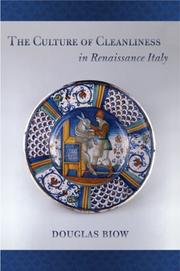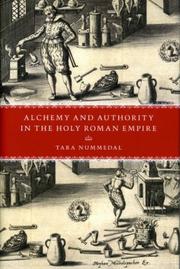| Listing 1 - 10 of 62 | << page >> |
Sort by
|
Book
ISBN: 9170548080 9789170548086 Year: 1996 Publisher: Stockholm Fischer
Abstract | Keywords | Export | Availability | Bookmark
 Loading...
Loading...Choose an application
- Reference Manager
- EndNote
- RefWorks (Direct export to RefWorks)
Book
ISBN: 9788891320186 8891320188 Year: 2021 Publisher: Roma ; Bristol : L'Erma di Bretschneider,
Abstract | Keywords | Export | Availability | Bookmark
 Loading...
Loading...Choose an application
- Reference Manager
- EndNote
- RefWorks (Direct export to RefWorks)
This volume collects essays dealing with the history of medicine in early modern Europe, and ranging from experiments and practices to the role of erudition in court-medicine, from the study of tarantism and plagues to the uses of drugs, from the collaborations and dissemination of medical knowledge to the epistemological classification of diseases. The essays aim to reveal the boundless investigation in medical knowledge, ultimately blurring the line of diverse fields, and focus on the extension of medicine as a scientia. Besides the investigation of specific figures and several case studies of early modern medicine, the volume opens with an exploration of the Medical School of Padua and also deals with some important locations that shape the science of medicine, such as anatomical theatres, botanical gardens, and museums.
Natural history --- Medicine --- History. --- History of Medicine --- History, Early Modern 1451-1600 --- Europe
Book
ISBN: 9512909200 9789512909209 Year: 1997 Publisher: Turku : [Dept. of] Cultural History,
Abstract | Keywords | Export | Availability | Bookmark
 Loading...
Loading...Choose an application
- Reference Manager
- EndNote
- RefWorks (Direct export to RefWorks)
Anatomy --- Anthropology --- Culture --- History, Early Modern 1451-1600 --- Human body --- Kultur. --- Körper --- Körper. --- Leiblichkeit. --- Philosophical anthropology --- history
Book
ISBN: 9780472037469 Year: 2019 Publisher: Ann Arbor (Mich.) : University of Michigan press,
Abstract | Keywords | Export | Availability | Bookmark
 Loading...
Loading...Choose an application
- Reference Manager
- EndNote
- RefWorks (Direct export to RefWorks)
"A major, pathbreaking work, History, Medicine, and the Traditions of Renaissance Learning is Nancy G. Siraisi's examination into the intersections of medically trained authors and history in the period 1450 to 1650. Rather than studying medicine and history as separate disciplinary traditions, Siraisi calls attention to their mutual interaction in the rapidly changing world of Renaissance erudition. Far from then-contributions being a mere footnote in the historical record, medical writers had extensive involvement in the reading, production, and shaping of historical knowledge during this important period. With remarkably detailed scholarship, Siraisi investigates doctors' efforts to explore the legacies handed down to them from ancient medical and anatomical writings and the difficult reconciliations this required between the authority of the ancient world and the discoveries of the modern. She also studies the ways in which sixteenth -century medical authors wrote history, both in their own medical texts and in more general historical works. In the course of her study, Siraisi finds that what allowed medical writers to become so fully engaged in the writing of history was their general humanistic background, their experience of history through the field of medicine's past, and the tools that the writing of history offered to the development of a rapidly evolving profession."--Jacket.
Historiography. --- History of Medicine. --- History, Early Modern 1451-1600. --- Humanism --- Medicine --- Medicine. --- Renaissance. --- Renaissance. --- Writing --- History. --- History --- History. --- 1500-1599.
Book
ISBN: 9781409425144 1409425142 Year: 2012 Volume: 997 Publisher: Farnham Ashgate
Abstract | Keywords | Export | Availability | Bookmark
 Loading...
Loading...Choose an application
- Reference Manager
- EndNote
- RefWorks (Direct export to RefWorks)
Esoteric sciences --- Astrology --- Magic --- Astrologie --- Magie --- History --- Histoire --- History, Early Modern 1451-1600 --- History, Medieval --- Astrology. --- Magic. --- Islam. --- Magie. --- Astrologie. --- History. --- Europa.

ISBN: 9780801444814 0801444810 Year: 2006 Publisher: Ithaca, N.Y. Cornell University Press
Abstract | Keywords | Export | Availability | Bookmark
 Loading...
Loading...Choose an application
- Reference Manager
- EndNote
- RefWorks (Direct export to RefWorks)
History of Italy --- anno 1400-1499 --- anno 1500-1599 --- Hygiene in literature. --- Hygiene --- History, Early Modern 1451-1600 --- Literature --- History --- history
Book
ISBN: 1472428137 9781472428134 9781315594651 9781317098362 9781317098379 Year: 2014 Publisher: Farnham Ashgate
Abstract | Keywords | Export | Availability | Bookmark
 Loading...
Loading...Choose an application
- Reference Manager
- EndNote
- RefWorks (Direct export to RefWorks)
History of medicine --- History, Early Modern 1451-1600 --- Medicine in Literature --- Medicine --- History --- History of human medicine --- History of Spain --- anno 1400-1499 --- anno 1500-1599

ISBN: 9780226608563 0226608565 9780226639727 022663972X 0226608573 Year: 2007 Publisher: Chicago : University of Chicago Press,
Abstract | Keywords | Export | Availability | Bookmark
 Loading...
Loading...Choose an application
- Reference Manager
- EndNote
- RefWorks (Direct export to RefWorks)
What distinguished the true alchemist from the fraud? This question animated the lives and labors of the common men—and occasionally women—who made a living as alchemists in the sixteenth- and seventeenth-century Holy Roman Empire. As purveyors of practical techniques, inventions, and cures, these entrepreneurs were prized by princely patrons, who relied upon alchemists to bolster their political fortunes. At the same time, satirists, artists, and other commentators used the figure of the alchemist as a symbol for Europe’s social and economic ills.Drawing on criminal trial records, contracts, laboratory inventories, satires, and vernacular alchemical treatises, Alchemy and Authority in the Holy Roman Empire situates the everyday alchemists, largely invisible to modern scholars until now, at the center of the development of early modern science and commerce. Reconstructing the workaday world of entrepreneurial alchemists, Tara Nummedal shows how allegations of fraud shaped their practices and prospects. These debates not only reveal enormously diverse understandings of what the “real” alchemy was and who could practice it; they also connect a set of little-known practitioners to the largest questions about commerce, trust, and intellectual authority in early modern Europe.
Alchemists --- Alchemy --- History --- History. --- Holy Roman Empire --- History, Medieval --- History, Early Modern 1451-1600 --- History, 17th Century --- Alchemy - History --- Alchemists - History - Sources --- Holy Roman Empire - History
Book
ISBN: 9781409463351 1409463354 9781138247628 9781315555027 9781317022374 9781317022381 1409463370 1409463362 1138247626 Year: 2013 Publisher: Farnham, Surrey : Ashgate Publishing Limited,
Abstract | Keywords | Export | Availability | Bookmark
 Loading...
Loading...Choose an application
- Reference Manager
- EndNote
- RefWorks (Direct export to RefWorks)
Sex differentiation --- Sex differences --- Différenciation sexuelle --- Différences entre sexes --- History --- History. --- Histoire --- Sex Differentiation. --- Sex Characteristics. --- History, Ancient. --- History, Early Modern 1451-1600. --- Reproductive Physiological Phenomena --- Reproductive and Urinary Physiological Phenomena --- Humanities --- Phenomena and Processes --- Sex Characteristics --- History, Early Modern 1451-1600 --- Human Anatomy & Physiology --- Health & Biological Sciences --- Physiology --- Différenciation sexuelle --- Différences entre sexes --- Sex differentiation - History --- Sex differences - History
Book
ISBN: 9780754669715 9780754697633 9781315583921 9781317130550 9781317130567 9781138266070 Year: 2010 Publisher: Farnham Ashgate
Abstract | Keywords | Export | Availability | Bookmark
 Loading...
Loading...Choose an application
- Reference Manager
- EndNote
- RefWorks (Direct export to RefWorks)
Esoteric sciences --- History of human medicine --- History of Europe --- anno 1400-1499 --- anno 1500-1599 --- Alchemy --- Midwifery --- Women in medicine --- Women in science --- Women --- History, Early Modern 1451-1600 --- Science --- History. --- history
| Listing 1 - 10 of 62 | << page >> |
Sort by
|

 Search
Search Feedback
Feedback About UniCat
About UniCat  Help
Help News
News